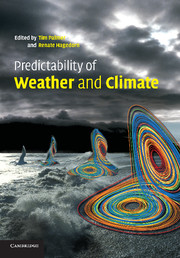Book contents
- Frontmatter
- Contents
- List of contributors
- Preface
- Chapter 1 Predictability of weather and climate: from theory to practice
- Chapter 2 Predictability from a dynamical meteorological perspective
- Chapter 3 Predictability – a problem partly solved
- Chapter 4 The Liouville equation and atmospheric predictability
- Chapter 5 Application of generalised stability theory to deterministic and statistical prediction
- Chapter 6 Ensemble-based atmospheric data assimilation
- Chapter 7 Ensemble forecasting and data assimilation: two problems with the same solution?
- Chapter 8 Approximating optimal state estimation
- Chapter 9 Predictability past, predictability present
- Chapter 10 Predictability of coupled processes
- Chapter 11 Predictability of tropical intraseasonal variability
- Chapter 12 Predictability of seasonal climate variations: a pedagogical review
- Chapter 13 Predictability of the North Atlantic thermohaline circulation
- Chapter 14 On the predictability of flow-regime properties on interannual to interdecadal timescales
- Chapter 15 Model error in weather and climate forecasting
- Chapter 16 Observations, assimilation and the improvement of global weather prediction – some results from operational forecasting and ERA-40
- Chapter 17 The ECMWF Ensemble Prediction System
- Chapter 18 Limited-area ensemble forecasting: the COSMO-LEPS system
- Chapter 19 Operational seasonal prediction
- Chapter 20 Weather and seasonal climate forecasts using the superensemble approach
- Chapter 21 Predictability and targeted observations
- Chapter 22 The attributes of forecast systems: a general framework for the evaluation and calibration of weather forecasts
- Chapter 23 Predictability from a forecast provider's perspective
- Chapter 24 Ensemble forecasts: can they provide useful early warnings?
- Chapter 25 Predictability and economic value
- Chapter 26 A three-tier overlapping prediction scheme: tools for strategic and tactical decisions in the developing world
- Chapter 27 DEMETER and the application of seasonal forecasts
- Index
- Plate section
- References
Chapter 22 - The attributes of forecast systems: a general framework for the evaluation and calibration of weather forecasts
Published online by Cambridge University Press: 03 December 2009
- Frontmatter
- Contents
- List of contributors
- Preface
- Chapter 1 Predictability of weather and climate: from theory to practice
- Chapter 2 Predictability from a dynamical meteorological perspective
- Chapter 3 Predictability – a problem partly solved
- Chapter 4 The Liouville equation and atmospheric predictability
- Chapter 5 Application of generalised stability theory to deterministic and statistical prediction
- Chapter 6 Ensemble-based atmospheric data assimilation
- Chapter 7 Ensemble forecasting and data assimilation: two problems with the same solution?
- Chapter 8 Approximating optimal state estimation
- Chapter 9 Predictability past, predictability present
- Chapter 10 Predictability of coupled processes
- Chapter 11 Predictability of tropical intraseasonal variability
- Chapter 12 Predictability of seasonal climate variations: a pedagogical review
- Chapter 13 Predictability of the North Atlantic thermohaline circulation
- Chapter 14 On the predictability of flow-regime properties on interannual to interdecadal timescales
- Chapter 15 Model error in weather and climate forecasting
- Chapter 16 Observations, assimilation and the improvement of global weather prediction – some results from operational forecasting and ERA-40
- Chapter 17 The ECMWF Ensemble Prediction System
- Chapter 18 Limited-area ensemble forecasting: the COSMO-LEPS system
- Chapter 19 Operational seasonal prediction
- Chapter 20 Weather and seasonal climate forecasts using the superensemble approach
- Chapter 21 Predictability and targeted observations
- Chapter 22 The attributes of forecast systems: a general framework for the evaluation and calibration of weather forecasts
- Chapter 23 Predictability from a forecast provider's perspective
- Chapter 24 Ensemble forecasts: can they provide useful early warnings?
- Chapter 25 Predictability and economic value
- Chapter 26 A three-tier overlapping prediction scheme: tools for strategic and tactical decisions in the developing world
- Chapter 27 DEMETER and the application of seasonal forecasts
- Index
- Plate section
- References
Summary
Reliability and resolution are the two main attributes of forecast systems. These attributes statistically relate the performance of a forecast system to verifying data in an abstract sense. Forecast attributes have been separately defined in the literature for systems that generate forecasts of particular formats or types. In this chapter, statistical reliability and resolution are defined in a general sense, irrespective of the type or format of a forecast. Statistical reliability is concerned only with the form of forecasts, whereas statistical resolution is concerned only with the predictive capability of a forecast system, related to the time evolution of the system that is being forecast.
The two main attributes are independent characteristics of a forecast system and can be quantitatively assessed by a host of different verification measures. The general definition of forecast attributes allows a systematic discussion of the relationship between the verification and calibration of forecasts. Calibration as defined here is an adjustment of the form of the forecasts, to match the distribution of verifying observations that follow the issuance of forecasts of a particular form.
Resolution, as the inherent predictive value of forecast systems, is the attribute most sought after by developers of forecast systems. Reliability, however, is equally important in real world applications. That calls for the generation of a long enough record of hindcasts to allow for a good calibration of forecasts, or, preferably, for improvements in forecast systems that directly lead to better reliability.
- Type
- Chapter
- Information
- Predictability of Weather and Climate , pp. 584 - 595Publisher: Cambridge University PressPrint publication year: 2006
References
- 13
- Cited by



